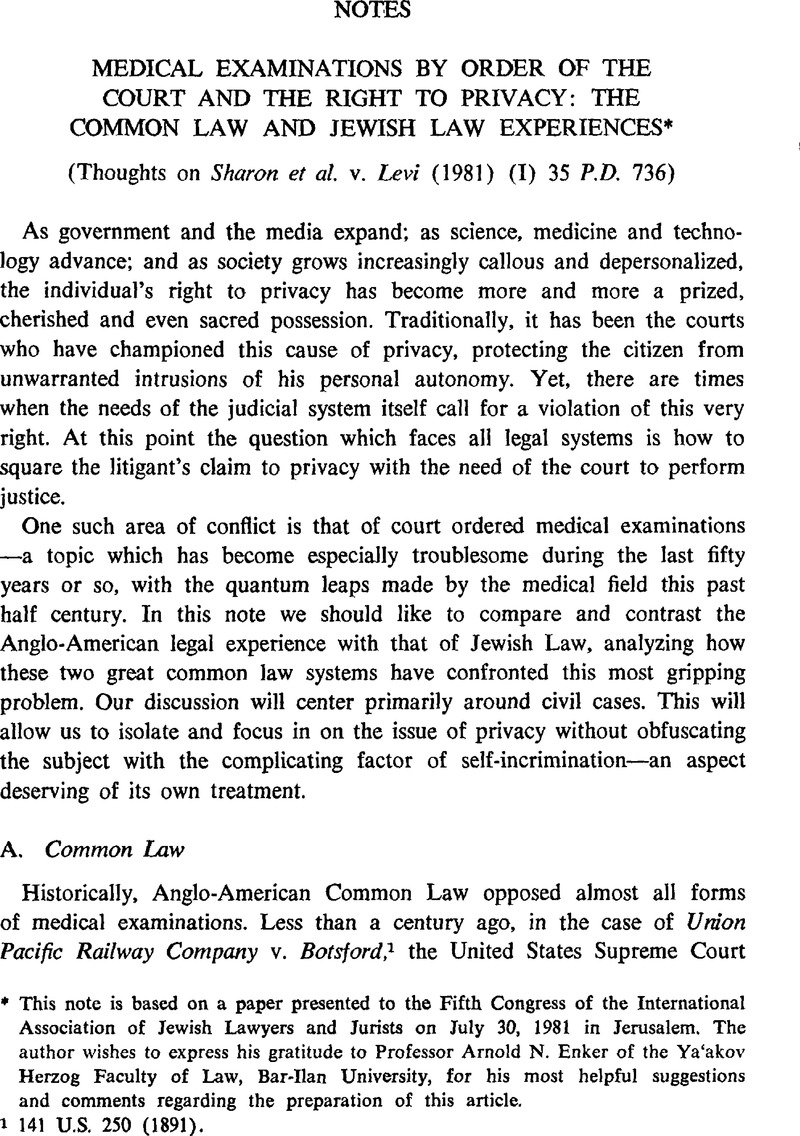No CrossRef data available.
Published online by Cambridge University Press: 12 February 2016

1 141 U.S. 250 (1891).
2 Id. at 251.
3 Id. at 252.
4 See 8 Wigmore, , Evidence, § 2220, n. 13 (3rd ed., 1940).Google Scholar
5 312 U.S. 1 (1940).
6 See Schlagenhauf v. Holder, 379 U.S. 104 (1964) which holds that it is constitutional for a court to enter judgment against a defendant who fails to comply with a court-ordered medical examination.
7 S. v. Mec; W v. W (HI(e)) [1972] A.C, 24; [1970] 1 All E.R. 1162.
8 Id. at 46.
9 Supra, n. 5 at 18. 18.
10 Id.
11 Peloni v. Almoni (1961) 15 P.D. 212 at 214.
12 See Frimer, Dov, “The Establishment of Paternity through Blood-Testing in Israeli Law and Jewish Law”, (1978) 5 Shenaton Ha-Mishpat Ha-Ivri 219 at 223–224, n. 19Google Scholar and sources cited therein (Hebrew).
13 See also Camden & Suburban R. Co. v. Stetson, 177 U.S. 172 at 175 (1900); Roe v. Wade, 410 U.S. 113 at 213–214 (1973).
14 Supra n. 11 at 217.
15 (1981) (I) 35 P.D. 736. For a digest of this case, see p. 104 of this issue.
16 Id. at 751–754.
17 Supra n. 7.
18 Supra n. 15 at 756–758.
19 Frimer, supra n. 12 at 239–241.
20 Supra n. 15 at 754, see also pp. 748–749.
21 See Frimer, supra n. 12 at 239–240 and sources cited therein. See in addition Responsa Yaskil Avdi, Vol. 6, E.H., Sec. 112, no. 7 and addendum, no. 4.
22 Lev. 5:1; Shulḥan Arukh H.M., 28:1.
23 Shulḥan Arukh, H.M., 17:3, 28:2 and commentaries ad. loc.
24 This ruling dates back to the Gaonic period (7th Cent. C.E. — 11th Cent. C.E.).
25 See Tur and Shulḥan Arukh, H.M. 16:4 and commentaries ad. loc. Cf. McQuigan v. Delaware, Lack, and W. R.R. Co., 129 N.Y. 50 at 54–55, 29 N.E. 235 at 236, 14 L.R.A. 466 (1891).
26 Cf. McQuigan v. Delaware, Lack, and W. R. R. Co., id.: “The power to compel an inspection of books and papers relevant to the controversy, in possession of either party, is of a similar nature to that invoked in the present case….”
27 (1974) 9 P.D.R. 331. Cf. Lamm, Norman, Faith and Doubt (New York, Ktav Publishing House, Inc., 1971) 293Google Scholar who writes: “The courts are thus not permitted any invasion of privacy denied to private citizens”. While this statement may be correct in the context of his discussion—the seizure of collateral—it is imprecise as a general conclusion of Jewish Law. Even with regards to the seizure of collateral, the law underwent development in the post-talmudic period. See Rakover, Nahum, “The Protection of Privacy in Jewish Law” (1975) 5 Israel Yearbook on Human Rights, 169 at 176–177.Google Scholar
28 Cf. Schlagenhauf v. Holder, supra n. 6 at 118.
29 357 U.S. 116 at 126 (1958).
30 See Responso Or Zaru'a and Maharam Ben Barukh, Kahana, Y. Z., ed., (Jerusalem, Mossad Harav Kook, 1943), sec. 403, p. 69.Google Scholar See also Rakover, supra n. 27 at 175.
31 Rabbi Waidenberg presently sits on the Rabbinical High Court of Israel.
32 Responso Tsits Eliezer, Vol. 7, Sec. 48, Chap. 7, no. 4, pp. 189–190. Cf. a similar case which appeared before the Rabbinical High Court of Israel, reported in Responso Yaskil Avdi, supra n. 21. There, however, the court merely dismissed the husband's suit explaining that without the required medical evidence the husband fails to carry his burden to prove that the couple's childlessness is in fact the wife's fault.
33 Supra n. 15 at 758.